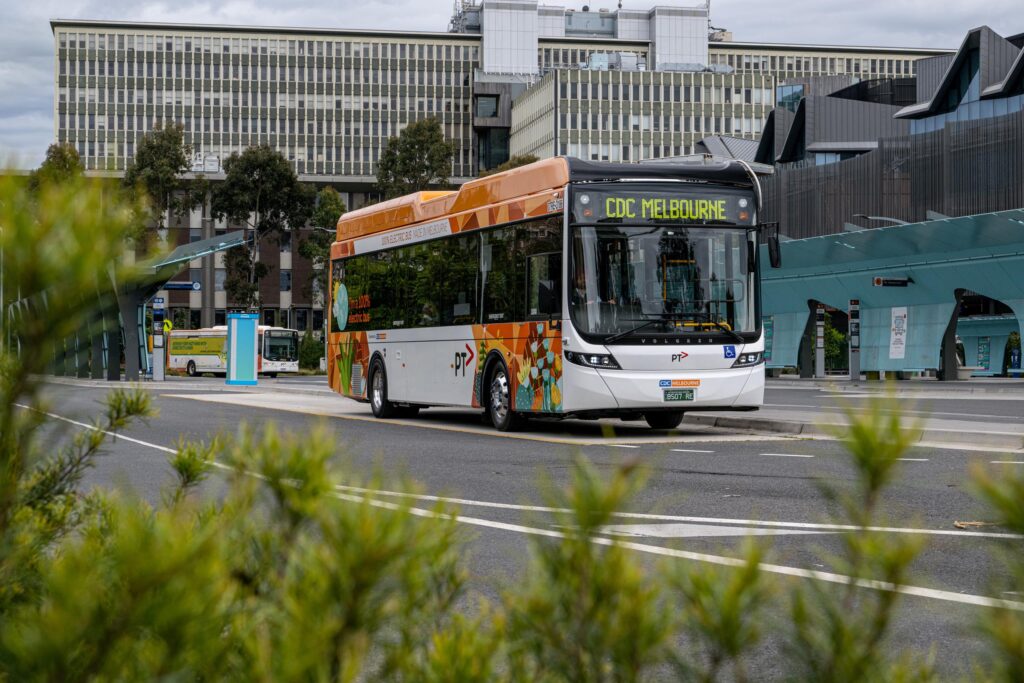
ComfortDelGro Corporation Australia’s (CDC) commitment to reducing emissions from its vehicle fleet has culminated in the commencement of its Zero Emissions Bus Trial in Melbourne’s south-eastern suburbs, in partnership with the Victorian Department of Transport and industry leaders.
The trial has begun with the first of eight battery-electric buses operating on route 601 on weekdays and route 630 on weekends, covering Huntingdale Station, Monash University, Gardenvale and Ormond Stations.
To provide a successful and reliable electrification of these services, Australia’s first offsite bus charging station is now operating at Monash University interchange. This is complemented by the charging stations at CDC’s Oakleigh depot.
The trial will also be the first use of the Volvo-Volgren battery-electric buses in the eastern states following their successful rollout in Western Australia.
In addition to reducing harmful diesel emissions in the service area, the Zero Emissions Bus Trial – which is a significant part of meeting the State’s commitment to zero net emissions by 2045 – will provide customers with a safe, efficient, reliable, smooth, virtually silent transport service. It is also providing Australian and Victorian manufacturing jobs through its partners.
ComfortDelGro Australia CEO, Nicholas Yap, said that the company is proud to collaborate with the Victorian Government, along with industry partners Volvo, Volgren, ENGIE, Monash University and TSA Advisory for its Electric Bus trial.
“This trial illustrates the benefits of industry leaders and government working together on the journey towards zero-emissions public transport, and I am excited to see it come to life on the streets of Melbourne,” Mr Yap said.
“As our customers in Melbourne have seen with the recent delivery of our 50th hybrid bus, we’re enthusiastic and committed to deploying technologies that reduce the emissions generated by the transport services we provide.
“While we do this to assist governments to attain their goal of achieving net zero emissions by 2045, we’re also passionate about reducing our impact on the planet.
“We expect to learn important lessons from this trial, to help us deliver more sustainable services across Australia.”
Volgren CEO, Thiago Deiro, said that he is pleased to see the Volvo-Volgren battery-electric buses serving Victorian customers for the first time.
“Volgren has committed significant investment to research, development and staff training to manufacture battery-electric buses in Australia and it’s a wonderful thing to see our partners coming together to make its Melbourne debut a success,” Mr Deiro said.
Volvo Bus Australia General Manager, Mitchell Peden, said that the first of many Volvo-Volgren battery-electric buses in Melbourne is good for Australia and the environment.
“Our BZL Electric buses provide a range of sustainability benefits in addition to producing zero tailpipe emissions,” Mr Peden said.
“From ethically sourced materials, including batteries, to having a 90 per cent recyclable chassis, we have made these vehicles sustainable in every way we can.”
Monash University Chief Operating Officer and Senior Vice-President, Mr Peter Marshall AM, said the trial is an important step towards reducing emissions given transport is the second-largest source of emissions in Victoria.
“This trial, including the advanced charging infrastructure that will be hosted at Monash University, will provide numerous research and education opportunities to help prepare Australia for a future with zero-emissions vehicles, and complements the University’s own commitment to transition our campuses to net zero emissions by 2030.”
TSA Advisory Senior Associate, Andrew Lau, said that his team has really enjoyed the collaborative effort to set this trial up for success.
“We’re proud of the contribution our transport consultants made to this project. They really showed their passion for shaping the journey toward a zero-emissions future.
“Through this trial, our team continues to demonstrate the breadth of our transport advisory and project management services, and their value in ensuring a smooth journey towards zero-emissions public transport.”